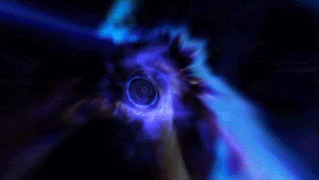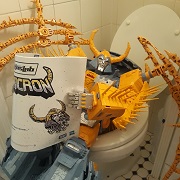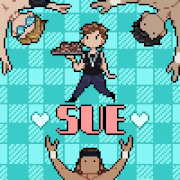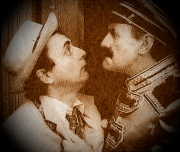adhuin posted:Dark Eyes 4! Finally! YAY! Runs off to download.
|
|
|
|
|

|
| # ? Jun 6, 2024 20:29 |
|
PriorMarcus posted:YAY! Runs off to download. this may be the first time i've ever seen you post "yay".
|
|
|
|
egon_beeblebrox posted:What are some good Mel Big Finish stories? I don't think I've ever heard one. (If I have, I have forgotten it). She never really bugged me on TV. The TV show was so odd while she was on it, it was just par for the course while I watched those stories. I'm a sucker for The Fires of Vulcan, her very first story. Good writing gives Langford a chance to actually act and she does quite well with the material.
|
|
|
DoctorWhat posted:this may be the first time i've ever seen you post "yay". I'm trying to be more upbeat. And I love Big Finish and Dark Eyes has been incredible so far. I'm listening to it now and it's really good.
|
|
|
|
|
I'm in the middle of listening to Dark Eyes 1 and it's really good. Toby Jones must be available for cheap.
|
|
|
|
Cuddlesome is one of the better of the little bonus stories I've heard, if only because it takes its absurd concept pretty much completely seriously (unless anything changes in the last 12 minutes).
|
|
|
PriorMarcus posted:I'm trying to be more upbeat. And I love Big Finish and Dark Eyes has been incredible so far. I'm listening to it now and it's really good. Did the secret santa I got you all those years ago stick then?
|
|
|
|
Little_wh0re posted:Did the secret santa I got you all those years ago stick then? Yeah. They were the first ever Big Finish audios I listened to and now I can't get enough. I'm not really working through them in any order, just whichever ones take my fancy/get good reviews here. I've listened to maybe a 100 now. Basically, you started a habit. So thank you. Except it's expensive, so... 
|
|
|
|
|
PriorMarcus posted:Yeah. They were the first ever Big Finish audios I listened to and now I can't get enough. I'm not really working through them in any order, just whichever ones take my fancy/get good reviews here. I've listened to maybe a 100 now. I was ready to laugh, until I counted my own. I'm over 100 with just counting the 8th and 4th Doctor audios
|
|
|
|
I'm getting close to running out of first 50 Im bothered about =\
|
|
|
|
Little_wh0re posted:I'm getting close to running out of first 50 Im bothered about =\ Someone send this post back to the dark times so they know how spoilt we are now
|
|
|
|
|
egon_beeblebrox posted:What are some good Mel Big Finish stories? I don't think I've ever heard one. (If I have, I have forgotten it). She never really bugged me on TV. The TV show was so odd while she was on it, it was just par for the course while I watched those stories. Carrot juice?! CARROT JUICE?! PriorMarcus posted:I'm trying to be more upbeat. This is APEX, isn't it? C'mon, admit it. You ate PriorMarcus' brain and and now you're pretending to be him.
|
|
|
|
adhuin posted:Dark Eyes 4! Finally! Ooooh yeah!  
|
|
|
|
Pesky Splinter posted:Ooooh yeah! Every time j see McQueen I mistake him for this guy. https://www.youtube.com/watch?v=YQ643U7ccpM
|
|
|
|
The Big Finish I am listening to currently is my 206th. I listened to first bunch at home, but most of those are during flights, my morning commute on the train, the 3-4 mile walks I take to get to friend's houses when the trains and buses are impractical, grocery shopping, waiting in line at the coffee shop, and the like. Not counting Bernice Summerfield (purely because she isn't on the Wikipedia page with all the lists, for some reason), there are 589 Big Finish stories with Doctor Who, counting all of the wacky spin-offs. By my count, if I keep up at my current rate, I will not be current with Big Finish until the year 2018, and as we all know, overpopulation will put Salamander in charge by then, so I'll probably be listening to them somewhere deep in the cave system beyond the Records Room.
|
|
|
|
Pesky Splinter posted:Ooooh yeah! Ever since I learned what Macqueen looks like he's popping up in everything. Minor character in The Thick of It, half a dozen lines in Black Mirror...
|
|
|
|
Bicyclops posted:Cuddlesome is one of the better of the little bonus stories I've heard, if only because it takes its absurd concept pretty much completely seriously (unless anything changes in the last 12 minutes). Cuddlesome is freaking amazing. Where The One Doctor is a farce through and through, Cuddlesome is a great mix of humor and horror. The idea of a Teddy Ruxpin-type doll coming to life is both funny and terrifying. There are two moments that stand out to me. The "War of the Cuddlesomes" during the climax. Imagine World War I battle noises with high-pitched squeaks and cries. And the "companion" for the story, after hearing the Doctor explain his theory about dolls come to life and agreeing with him. quote:Doctor - "...you agree with me?" If you haven't heard it and you have an hour to kill, hit up Soundcloud and give it a listen.
|
|
|
|
CobiWann posted:
It's even better. It's after he's just theorized that the dolls are biting people and told her that he's an alien called a Time Lord. He asks "You believe me?" and she responds with "No, but I've been drinking." I also love Turvey's story, which is basically some bizarre mixture of Bastian from Brideshead Revisisted and any given Stephen King story about being bullied. And it's got David Troughton in it, which is always a plus.
|
|
|
|
Oh god this is great! "Give me a cuddle, JOHN!"
|
|
|
Chokes McGee posted:This is APEX, isn't it? C'mon, admit it. You ate PriorMarcus' brain and and now you're pretending to be him. I don't get the reference but I'm definitely PriarMarcos.
|
|
|
|
|
It's basically Talky Tina from that Twilight Zone episode, except both funnier and creepier.
|
|
|
|
PriorMarcus posted:I don't get the reference but I'm definitely PriarMarcos.
|
|
|

|
|
|
|
|
Being as vague as possible, Dark Eyes 4 is pretty good. First episode has barely any relevance to the rest of the story though. MacQueen is the real highlight.
|
|
|
|
Pesky Splinter posted:Being as vague as possible, Dark Eyes 4 is pretty good. First episode has barely any relevance to the rest of the story though. MacQueen is the real highlight. This is probably my favorite since the first Dark Eyes. 2 was okay but felt more just like four unrelated stories thrown together, and 3 was just all over the place. I quite liked 4 overall.
|
|
|
|
Bicyclops posted:Someone should make proto-Ace a real companion with Big Finish, somehow, though. Other than her, I don't remember much about Delta and the Bannermen, probably because I have willfully blocked it from my memory. Gods and Monsters spoilers: Fenric actually mentions her at one point, he influenced her life the same way he did Ace's to make the perfect companion. When that didn't work, he refined the formula a bit et voila, Ace. Like a lot of Fods and Monsters, it's a little overwrought and dumb
|
|
|
|
Sarah Griffiths, who played proto-Ace, is apparently inconsequential enough that she doesn't even have her own Wikipedia page, although it does seem she kept getting work.
|
|
|
|
Bicyclops posted:Sarah Griffiths, who played proto-Ace, is apparently inconsequential enough that she doesn't even have her own Wikipedia page, although it does seem she kept getting work. She was in BF's "I.D." with Colin.
|
|
|
|
Dark eyes 4. I really liked part one. Am looking forward to hearing the rest when I get home from work.
|
|
|
|
So ReGeneration Con got another guest...Andrew Cartmel. Just as he planned.
|
|
|
|
So I finished listening to Dark Eyes 4 today and it's really, really good. I don't have a single bad word to say about it.
PriorMarcus fucked around with this message at 20:21 on Mar 3, 2015 |
|
|
|
|
 The year is 325AD. In the city of Nicaea, the first great Church council, called by the Roman Emperor Constantine, is due to begin. Here theology, philosophy and politics will be brought together for millennia to come. The Doctor, Peri and Erimem are there simply to watch events unfold. Gaps remain in the history books, and the Doctor has come to satisfy his curiosity. But none of them are ready for what greets them in Nicaea. Intrigue within the Imperial Palace has become violence on the streets. Mobs roam the alleyways and blood is spilt in the name of faith. Even in the face of murder and injustice though, the time travellers must force themselves to stay aloof. This is history, after all. Yet what is history to one person is the future to another. Is it possible for history to be rewritten? And if it can, can the Doctor afford to let it? Peter Davison is the Doctor in The Council of Nicaea X X X X X Cast Peter Davison (The Doctor ) Nicola Bryant (Peri) Caroline Morris (Erimem) David Bamber (Emperor Constantine) Claire Carroll (Fausta) Steve Kynman (Arius) Martin Parsons (Athanasius) Michael Garland (Clement) Sean Carlsen (Centurion Gaius) Stephan Bessant (Julius) Jason Stevens (Clothing Stallholder) Written By: Caroline Symcox Directed By: Gary Russell Trailer - http://www.bigfinish.com/releases/popout/the-council-of-nicaea-237 X X X X X And I really wanted to like this story too… Well, that’s not quite fair. The Council of Nicaea is a perfectly passable serial, but it had the potential to be a great one. While technically sound and enjoyable, many concepts and ideas within the story come off as the opposite of what they should have been. A pivotal moment in Western history is barely utilized beyond its introduction. Story driving events aren’t so much plot points as they are convenient moments. Two opposing clerics with staunch viewpoints don’t get a chance to confront one another or get any real characterization. And while one companion is completely superfluous to the story, the other one considers standing up for the oppressed to mean a lot of shouting, pouting, and accusing her friends of trying to betray her. When bound together in a single gospel, The Council of Nicaea barely secures a passing motion. Nicaea, Anatolia, the Roman Empire, 325 AD. As the young Christian church struggles to define its central doctrine, violent clashes have occurred between followers of differing theologies. In an attempt to end the bloodshed and bring peace to the Empire, the Roman Emperor Constantine convenes the Council of Nicaea. Here, the bishops of the church, under the eye of the Emperor and his legions, will settle questions of philosophy, theology, and politics once and for all. The Doctor, always keen to fill in the gaps in his historical knowledge, has brought Peri and Erimem to Nicaea to watch the Council debate and establish canonical law that will endure for centuries. Along the way, Erimem meets the cleric Arius, whose argument with fellow cleric Athanasius over the very nature of Jesus Christ is at the core of the debate rocking the church. When Erimem realizes that Arius will not be allowed to speak in his own defense and that the bishops will decide the fate of his creed, she decides to bring his case to bear in the council chambers herself. Her words set off conflict across Nicaea, not only between rival sects, but between herself and the Doctor…and all the while, Constantine himself wonders what he must do to silence this young woman and keep the peace… For a canon that’s been everywhere and used every single setting and genre one could possibly think of, Doctor Who rarely touches upon religion. On television, the idea of the Devil was discussed in the serials The Daemons and The Beast Below/The Satan Pit. On the audio side, there have been Charles Darwin’s sudden disregard of the notion of God in Bloodtide and the pure-farce-turned-chilling-nightmare that was The Holy Terror, mixed in with Faith Stealer’s respectful look at extremism. The First Council of Nicaea attempted to establish a universal consensus across the fledgling Christian church, making it a major moment in Western history, both in a religious and a secular sense. Writing about religion in any sense runs the risk of being inflammatory or controversial, no matter how much care is taken by the author. For The Council of Nicaea, however, the writing appears to be in good hands. Caroline Symcox, wife of prolific Who writer Paul Cornell, is many things. She’s an Oxford graduate, a minister in the Church of England, and writer of one of the Eighth Doctor’s best stories, Seasons of Fear, where the Doctor chases a foe across three different historical eras. With both historical and theological knowledge on hand, Symcox’s script should be respectful and educational. Sadly, for a story set during the Council of Nicaea, Symcox barely mentions the synod outside of using it as an historical setting and giving Erimem a chance to shout about injustice. It’s easy to understand Symcox wanting to not make waves or stir up any sort of debate, but the actual meat of the Council and the controversy it was supposed to address (Athansius believed that the Son of God was just as divine as the Father, while Arius believed that the Son was OF God, so therefore God must have more divinity than the Son) is briefly outlined by Arius…and dismissed by Peri, giggling, with a simple “that’s it?!? You’re fighting each other over the divinity of Jesus Christ?” The controversy itself is never mentioned again outside of Arius and Athansius’s supporters clashing in the streets (and even then the actual schism isn’t brought up outside of repeated cries of “heretic!”), putting the bulk of Erimem’s story as a crusade for “justice.” We’re told repeatedly just how important the debate is…indeed, the ruling in favor of Anthansuis is the basis for the first paragraph of the Nicine Creed, which is still repeated in church services today…but we’re never told just WHY the debate is important, other than “my side is right, but if we keep fighting, Constantine will kill us all.” I got the impression during The Council of Nicaea that this was supposed to be Erimem’s “big” audio as a companion, the story that firmly planted her on the map as a force to be reckoned with. As a female Pharaoh whose views were downplayed or ignored solely because she was a woman, it makes sense for Erimem to want to be “the voice of the voiceless.” Instead of a proud, vital leader, what Caroline Morris gives us is a whiny, petulant young woman simply pretending to be a leader for most of the story. The bold, confident “out of my way” Erimem that we saw in Three’s a Crowd has given way to someone who doesn’t hear both sides of the story before making her decision, speaks up on a whim to a room full of powerful strangers, condemns people without knowing them, and claims that her closest travelling companions betrayed her to the Romans. Erimem isn’t bold or clever in this story. In fact, she comes off as stubborn and dumb for most of it. Morris falls into the “shouting is emotion” school of acting during The Council of Nicaea, flinging what could have been valid points with hot venom. It felt incredibly “rebelling against parents,” very “I won’t do what you tell me because I think I’m right,” with all of Erimem’s youth on display and NONE of the wisdom one would think she absorbed during her time as rule of Egypt. What makes it a bit sad is how some of that wisdom DOES shine through, especially during the climax of the story where she organizes a peaceful demonstration of protestors and manage to keep them peaceful in the face of armed legionaries. A little finesse, a softer touch, some more wisdom and characterization from previous serials is what Erimem could have used in this story. Peri? Well, aside from dismissing the whole argument as “silly”…maybe in the 20th century, but this is the 4th century…Peri’s presence is this story is solely as a plot device, to get yelled at by Erimem, to get asked questions by and give answers to the supporting players, and to cause conveniences to move the story along. Nicola Bryant gives us the Peri we’ve come to expect from Big Finish – sarcastic, a bit dour, a bit cheerful, but NOT a bit direct, which is exactly what was needed in this story. A few direct questions or explanations would have done wonders for moving the story along, but doing so would have cleared up messy situations or actually solved problems. Instead, we get Peri being chirpy, childish, and a bit whiny. Luckily, Peter Davison carries the day for the TARDIS crew. This is the kind of dramatic material Davison excels at, where his character is firm, but flexible when the situation calls for it. He tells Erimem they’re leaving, but when she threatens to stay behind and abandon him, he adapts to the situation and tries to work with what he’s got. The Doctor’s scenes with Constantine where he convinces the Emperor to trust him are some of the best in the story, equaled by his determination in stressing that history can’t be rewritten, no matter how badly Erimem wants to wield the pen. I swear, Davison was channeling William Hartnell from The Aztecs in his story, save for the fact that the First Doctor would have probably tapped Erimem on the forehead with his cane and called her a stupid child before dragging her back to thr TARDIS. This is easily Davison’s best all-around performance since Omega, and it shows that the problems with The Council of Nicaea might not be coming from Symcox’s script, but from the performances of its other two leads. The Emperor and his wife are the standouts of the supporting cast. History has shown that Constantine was pragmatic and ruthless, whose reforms led Rome into its last great age, while maintaining a tyrannical grip to uphold law and order. David Bamber, before he was Captain Quell in Mummy on the Orient Express, Cicero in HBO’s Rome ,and Hitler in the Tom Cruise movie Valkyrie, was Emperor Constantine. Bamber’s vast experience allows him to play the Emperor dedicated to a peaceful empire by any means necessary. If it means giving a speech to the crowd, so be it. If it means exiling one of the two clerics, so be it. If it means sending out the legions, so be it. One senses the strength behind the Emperor through Bamber’s performance, that instead of coming off as a one-note, mustache-twirling villain, he’s a complex man who wants to hold the Roman Empire together. Bamber’s performance is balanced nicely by his wife Fausta, played by Claire Carroll. Sometimes Lady Macbeth, sometimes nice and kind, Carroll shows the balance Fausta walked as she lived with Constantine, both sharing in his power while also bowing to the might of the Emperor. Knowing that 13 years down the line Constantine would steam her to death, suspecting she would betray him, the Doctor’s revelation of her fate explains Fausta’s actions (and Carroll’s performance) very nicely. But the central conflict isn’t about Constantine and Fausta. It’s about Arius (played by Steven Kynman, who’s largely been involved in children’s television and movies such as Muppet Treasure Island) and Athanasius (Martin Parsons). And frankly, their characterization boils down to “I’m right, my opponent is a heretical IDIOT.” Arius gets a bit more development, stating that he believes in his creed, no matter what the bishops decide. The Doctor lays out their final fates to Peri and Erimem, and they also draw back into the performances of Kynman and Parsons, but still, I was expecting a bit of theological debate between the pair, especially with Symcox’s background. It wouldn’t have to be anything in depth or controversial, just having the two men, whose thoughts are ripping the world’s most powerful empire in half, actually argue directly with one another for a few moments over matters of faith. It would have added more weight to the story’s proceedings along with a sense of…not urgency, but meaning to everything. Where the story truly loses me is the central argument between the Doctor and Erimem. The Doctor insists that time can’t be rewritten. Not one line. And considering he’s a Time Lord, wouldn’t he know best? But Erimem stresses that this is HER future, and therefore she can change history. This is supposed to be Erimem standing up to the Doctor. This is supposed to be the “pump the air” moment where Erimem implies that the Doctor isn’t Time’s Champion, but Time’s Bitch. But really, this moment should be followed by the Doctor going “yes, and I know what happens. Peri knows what happens. Nearly 1800 years of human history knows what happens. You change this, and those 1800 years of religious history, not just for Christians both Catholic and Orthodox but for Jews and Muslims, will be undone, all because you’re throwing a temper tantrum. That will have immense consequences for the Web of Time.” But this isn’t mentioned at all, because mentioning it during the climax of the first or second episode would cause the rest of the serial to become moot. There is the core of a great story here, but Symcox focuses on the wrong ideas, or on the mirror image of the right ideas to instead just put forth a story about standing up for “justice” by stomping your feet and yelling a lot. It’s a bit of a bummer how the overall story turns out, especially since the audio work is amazing. Crickets, taverns, barracks, the marble floors of the Emperor’s palace in Nicaea, the sounds of debate, rioting, and peaceful demonstration…the atmosphere and sound effects are so good in bringing 4th century Nicaea to life that I reloaded Total War: Rome II on my computer solely to play as Rome, and I may or may not yell out “THIRTEEN” during a stressful situation. But the story isn’t itself has little to do with Rome, or Christianity, or the Council of Nicaea. It could have been set anywhere, at any time, when two groups were arguing about a volatile topic. It’s a tale about rebelling against authority, of standing against injustice, of giving people a voice, and it does none of these things very well. The Council of Nicaea gives us great performances by Peter Davison and David Bamber, but beyond that, there’s little in this story to make it a lasting standout. Synopsis – Neither Roman, nor Christian, nor about the synod itself, The Council of Nicaea succeeds in placing the listener in the heart of the Empire, but fails to make use of the setting, giving listeners “loud and shouty” in place of “bold and proud.” 3/5. Next up – “Welcome back, Doctor…” Paul McGann is the Doctor in…Terror Firma
|
|
|
|
CobiWann posted:I may or may not yell out “THIRTEEN” during a stressful situation. It is possible I also do this. I wanted those two to become immortal somehow and trundle through all of history being the cause of every major event on the books.
|
|
|
|
I've been pretty consistently impressed with the foley work in the big finish audios
|
|
|
|
|
CobiWann posted:
Yeah this is just squandered potential through and through. They take a fascinating period of history, a potentially compelling "I'm going to define myself as a person and stop letting others dictate my life to me" turn for Erimem and even a chance for some (potentially controversial) religious arguments.... and do very little with any of them. Erimem really does come across like a petulant child throwing a temper tantrum at points, which is especially disappointing since this is supposed to be her stand-out, character-defining story, and the Doctor and Peri are reduced to inarticulate or mute because even 5 minutes of reasonable conversation would have easily punctured through all the miscommunication/misunderstandings and effectively negated the entire story. Little_wh0re posted:I've been pretty consistently impressed with the foley work in the big finish audios The early stories tried hard but often fell short, but I have noticed a marked improvement through the latter half of the first 100 audios, they've even started to get crowd scenes that sound like actual crowds and not 3 dudes mumbling over each other in an empty room!
|
|
|
|
Started The Fearless and... I was not expecting Gundam. Big Finish is still full of surprises! I know I like the Dalek Empire stories more than a few here, at least once I figured out what they were going for. But since this one takes place earlier during the first series, it's a little hard to take the Dalek threat seriously when I already know it's an elaborate distraction from their real plan, which is exactly the same as how Captain Murphy wanted to get out of the supply closet on Sealab. Nick Briggs, I just can't get mad at you.
|
|
|
|
 Red is a story set in a poorly defined world peopled by poorly defined characters with a poorly defined backstory. The characters are not only poorly defined, but inconsistently written both as individuals and as a society. The central antagonist of the story (due to the true antagonist being an unseen mystery for 7/8ths of the story) has an unexplained origin, which links in to the issue with the society as a whole - the back story makes no sense, is ill-defined, inconsistent, and never explained in any adequate way. However, despite all that, Red is a very enjoyable story to listen to, primarily because of the excellent voice work of Sylvester McCoy as the 7th Doctor, and John Stahl as White Noise. Big Finish's technicians earn their pay too, adding modulation and distortion in all the right places to enhance these performances without swamping or overpowering them. As a clash of philosophies, the confrontations between the Doctor and White Noise are sadly lacking, but there is enough there to spark the imagination, and hearing the ever assured computer and its unassailable logic crash against the unbending determination of the Doctor to prove his point makes for a pretty fun listen. The Doctor and Mel arrive at The Needle, a malleable city that shifts and changes at the whim of White Noise, the computer system that controls and maintains the city... and its inhabitants. The TARDIS suffered a lurch in flight, with the Doctor declaring there was some kind of temporal/telepathic assault on the ship that hurt it, and as a result hurt him too. Determined to get to the bottom of things, he leads Mel into The Needle where they immediately stumble across three dead bodies. This is unsettling at the best of times, but even more so in The Needle where violence is supposedly impossible. All inhabitants are "chipped", their mental impulses for aggression and violence blocked by White Noise's ever vigilant control, edits made to the memory and brain chemistry of any who appear to be slipping away from the "perfect" society that is the price of residence. Unfortunately, there has been a growing number of cases of "Redlining", as inhabitants seemingly lose their minds and become obsessed with "red", taking out their now uncontrolled urge for violence on the nearest available person - the moment the deaths occur, the redline ceases, and the murderer returns to normal. To keep the society in check as well as fulfill its own requirements for a violence-free society, White Noise edits memories and removes physical evidence, so that nobody - including the murderer - remembers the person who was killed, effectively murdering them again by removing them from existence both legally and mentally. So the arrival of the Doctor and Mel - two unchipped individuals who thus have a capacity for violence and cannot be controlled by White Noise - is a major problem for the machine, one it means to rectify by whatever means necessary. This causes the Doctor to be chipped, and Mel to seemingly be killed when she is knocked off of The Needle to drop to the ground far, far below. The trouble with the concept of this society is that so much about it goes unexplained. This kind of vague, barely sketched backstory can work when used effectively, but here the worldbuilding feels incomplete, like the barest hint of a much more interesting story that goes unremarked upon by any of the characters, and left me feeling unsatisfied. The people who live in The Needle do so by choice, but there is the suggestion that White Noise was put there by a third party, that it is in effect alien, and it imposes its will not just on the inhabitants but anyone unlucky enough to be passing by close enough to the planet to risk "infecting" it with uncontrolled violence. Nothing more ever comes of this, the tantalizing glimpses seen in discussion between White Noise and Controller Blue indicate some greater authority/force in control of what may be an experiment, but then it never comes up again at any point in the story. When White Noise is eventually overcome as a controlling force of the city and the inhabitants are left to their own devices, there is no suggestion that the people in charge are going to return and reassert their authority, if indeed they have an authority to impose. Compounding this is the issue of the inhabitants - those who live in The Needle are supposedly debauched hedonists indulging in every pleasure to try and fill the hole left by the inability to express the rage and anger that are natural (and still existing) parts of their psyche.... but everything about the inhabitants we hear indicates they are actually a staid, unremarkable and unadventurous lot who fill their days holding respectable cocktail parties where they get a little tipsy, or watching simulated bloodsport on television while indulging in mild, unconsummated and uninteresting affairs. Meanwhile the people who live in the undercity are supposedly the lower class, free of White Noise's control but desperately working to hold back their own uninhibited desires, particularly for violence. But they come across more like upper class hedonists than the ones they supposedly despise in The Needle, taking on a bemused, detached air of excitement over the notion of pain or fear. When Mel lands on the dirigible of one of these, he takes great fascination in her potential for unrestrained violence and greater delight in threatening her with a blade. His sister is eager to offer Mel drugs over taking her to see a surgeon, and bizarrely Mel accepts even though it isn't till much later that the sister explains just why the surgeons of this society are to be avoided. There is never any real sense that either group above or below is all that different from each other, and while they may have been the intended point, the idea I got from listening is that I should have been taking these descriptions at face value. But as I noted, all these issues aside the real quality of the story comes from the vocal performances of McCoy and Stahl. Character-wise they clash well if too little, but it's their voices that really capture the imagination. While any "vaguely troubling/potentially dangerous" Artificial Intelligence will inevitably be compared (and fall short) to HAL, White Noise does a good job of sounding almost human, so that its cold and calculating work to fulfill its mission parameters always sound almost reasonable. The way it dismisses Chief Blue's concerns, the Doctor's warnings, Mel's well-being, the flaws in their society etc never come across as the ravings of a madman (or mad computer), but as the reasoned, thought-out and sensible conclusion to an unfortunate but not particularly pressing problem. Meanwhile the Doctor does a great job of selling his desperation and fear as his "chipping" sees him synchronized with the mysterious killer taking control of the inhabitants of The Needle. Able to fight off the malign influence himself, he is powerless to prevent it from controlling its other puppets and making them kill on its behalf, which causes him no end of guilt. The difference between the Doctor and the others though is that he recognizes his own potential for violence but doesn't seek artificial control of it, and in making that choice he is also able to make the choice to NOT be violent even when the artificial urge seems undeniable. So over the course of the story we slowly see him move from struggling just to cast off the "Red" control, to wresting some small measure of control away from the killer (and importantly, giving the choice to the puppet rather than forcing it on them), to coming face to face with the killer, staring it down, and smugly mocking it as he outmaneuvers it. This is the 7th Doctor who we have seen take down societies and empires, even though explicitly the story seems to be set early in his regeneration (Mel references her concerns about his mental state as seen in Time and the Rani and Unregenerate!), and he acknowledges that he has blood on his hands, that he IS a killer - but that also doesn't define him, and it doesn't control him. White Noise, meanwhile, never seems able to accept that it is flawed, or that there is any chance that IT is the danger to the society it is programmed to keep safe. Even when it accepts that there is a potential for corruption somewhere in its software, it falls back on its programming, runs a reboot on its systems, and then declares it is now impossible for it to be "infected" and thus the issue must be somewhere else. So it comes to the most logical conclusion possible, it must remove all threats to the society, and as every inhabitant is a potential host for the "Red", it must remove those. In perfect machine reasoning, it begins killing every member of the society in order to save... the society! The indifferent, efficient way it smoothly calls out the name of each inhabitant as it burns out the chip in their brains and kills them is blood-chilling, somewhat undermined by the fact that the Doctor and Mel have an "amusing" bit of bantering argument while this recital is going on in the background. The Doctor confronts the killer mind-to-mind and comes out on top, and after dealing with that he emerges to work with Mel to similarly quarantine White Noise, thus removing the other external threat to the society. With White Noise and the killer no longer a threat, it leaves the society in ruins though - without that omnipresent oversight, they will have to completely rebuild and relearn how to look after themselves, how to control their emotions (positive and negative), how to work together and stop seeing each other as props or objects for their own self-interest/pleasure. Though the Doctor will be the first to tell a companion not to impose their own morality on an alien society, he seems pleased as punch over this - yes they're going to struggle and stumble and have to go through rough times.... but at least THEY will be the masters of their own destiny, rather than letting somebody/something else handle everything for them. Red doesn't have much going for it as a story in its own right - it doesn't really do anything new or original, nothing that other stories (both in Doctor Who and fiction in general) haven't done far better in the past. But the performances of McCoy and Stahl, enhanced by the professional touch of Big Finish's sound-team, give it a flourish that is very welcome. Nobody else is particularly bad, nor are they stand-out good, but they do their jobs functionally well, working with a script that is unremarkable if solid. This isn't a murder-mystery, the identity of the killer is revealed late and only works due to information only revealed at the moment of the reveal, but it works well enough to fill-in the backstory of one of the characters present throughout the story, and make sense of many things said by and about them in the previous episodes. This is a story you listen to because of the way it sounds, as opposed to the uniqueness or quality of the content. That's not always a bad thing, however, and this certainly isn't a bad story.
|
|
|
|
Jerusalem posted:
I would add that the murderer is (spoilered just in case) extremely obvious from the get-go, as well as being a last minute explanation. You've captured it, though. From all accounts, it should be a sort of infuriating story. It's your basic, ill-defined dystopia that seems to exist in a video game town sized planet, the street rat characters are a bit boring, all of the tension occurs instantly and feels forced. The eloi-equivalent tower-folk, particularly the one with her elicit discs, are non-entities. It's like The Island minus backstory. Describing it on paper makes it sound awful. But Stahl (and lets give some of the credit to the people who did his voice modulation and who produced the actual white noise that hums in the background) really just makes you want to curl up and wrap his blanket voice around you, even while there's something unsettling about it tickling the back of your mind. And McCoy just rrrrrrrelishes his part so much, it's hard not to be on board even if you're laughing at it a little. I really can't give Stewart Sheargold any of the credit for this one. It's the foley folks, the voice modulation and a couple of the actors. It's just the technical marvel of a few individual performances that elevates it, if only because it's so abundantly clear that the producers at Big Finish are very aware of the medium they're working in and despite being one of the only games operating in town, they work very hard at getting the most of that medium.
|
|
|
|
Bicyclops posted:But Stahl (and lets give some of the credit to the people who did his voice modulation and who produced the actual white noise that hums in the background) really just makes you want to curl up and wrap his blanket voice around you, even while there's something unsettling about it tickling the back of your mind. Yeah, the voice is really important too because it helps make it seem somewhat believable that people would be willing to allow White Noise to do the things it does to them, because it manages to talk in a way that makes the most insane and terrifying things seem utterly reasonable and even welcoming. The back-and-forth between Controller Blue and White Noise is particularly good too, since Blue has a defined degree of autonomy and is actually free to question and comment on White Noise's decisions, and White Noise is constantly trying to convince him to give up this autonomy for "increased efficiency".
|
|
|
|

|
| # ? Jun 6, 2024 20:29 |
|
I enjoyed dark eyes 4 (especially the first episode, even those it was basically an outsiders look at Edge of Tomorrow/All You Need Is Kill & Groundhog Day but now I'm excited for this. http://www.bigfinish.com/news/v/doctor-who-the-third-doctor-adventures---cover-revealed I just hope the bloke they got in for Pertwee does a decent job.
|
|
|






















